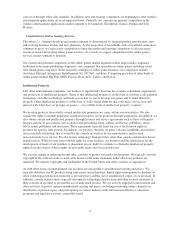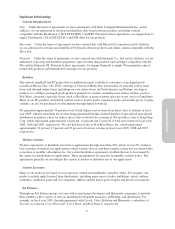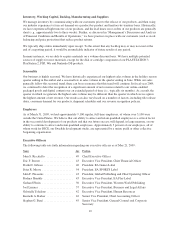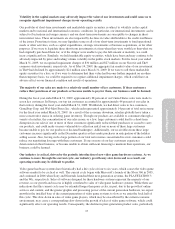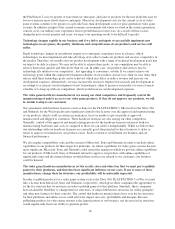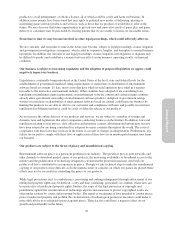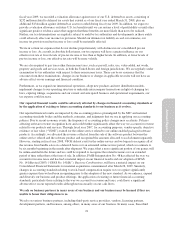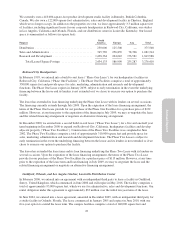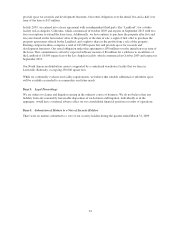Electronic Arts 2009 Annual Report Download - page 97
Download and view the complete annual report
Please find page 97 of the 2009 Electronic Arts annual report below. You can navigate through the pages in the report by either clicking on the pages listed below, or by using the keyword search tool below to find specific information within the annual report.
Annual Report
If we are unable to maintain or acquire licenses to include intellectual property owned by others in our
games, or to maintain or acquire the rights to publish or distribute games developed by others, we will sell
fewer hit titles and our revenue, profitability and cash flows will decline. Competition for these licenses
may make them more expensive and reduce our profitability.
Many of our products are based on or incorporate intellectual property owned by others. For example, our EA
SPORTS products include rights licensed from major sports leagues and players’ associations. Similarly, many
of our other hit franchises, such as The Godfather, Harry Potter and Lord of the Rings, are based on key film and
literary licenses. In addition, one of our most successful products in fiscal year 2009, Rock Band 2, was a game
which we did not develop, but for which we had acquired distribution rights. Competition for these licenses and
rights is intense. If we are unable to maintain these licenses and rights or obtain additional licenses or rights with
significant commercial value, our revenues, profitability and cash flows will decline significantly. Competition
for these licenses may also drive up the advances, guarantees and royalties that we must pay to licensors and
developers, which could significantly increase our costs and reduce our profitability.
Our business is subject to risks generally associated with the entertainment industry, any of which could
significantly harm our operating results.
Our business is subject to risks that are generally associated with the entertainment industry, many of which are
beyond our control. These risks could negatively impact our operating results and include: the popularity, price
and timing of our games and the platforms on which they are played; economic conditions that adversely affect
discretionary consumer spending; changes in consumer demographics; the availability and popularity of other
forms of entertainment; and critical reviews and public tastes and preferences, which may change rapidly and
cannot necessarily be predicted.
If we do not continue to attract and retain key personnel, we will be unable to effectively conduct our
business.
The market for technical, creative, marketing and other personnel essential to the development and marketing of
our products and management of our businesses is extremely competitive. Our leading position within the
interactive entertainment industry makes us a prime target for recruiting of executives and key creative talent. If
we cannot successfully recruit and retain the employees we need, or replace key employees following their
departure, our ability to develop and manage our business will be impaired.
Acquisitions, investments and other strategic transactions could result in operating difficulties, dilution to
our investors and other negative consequences.
We have engaged in, evaluated, and expect to continue to engage in and evaluate, a wide array of potential
strategic transactions, including (1) acquisitions of companies, businesses, intellectual properties, and other
assets, (2) minority investments in strategic partners, and (3) investments in new interactive entertainment
businesses (for example, online and mobile games). Any of these strategic transactions could be material to our
financial condition and results of operations. Although we regularly search for opportunities to engage in
strategic transactions, we may not be successful in identifying suitable opportunities. We may not be able to
consummate potential acquisitions or investments or an acquisition or investment we do consummate may not
enhance our business or may decrease rather than increase our earnings. The process of acquiring and integrating
a company or business, or successfully exploiting acquired intellectual property or other assets, could divert a
significant amount of resources, as well as our management’s time and focus and may create unforeseen
operating difficulties and expenditures, particularly for a large acquisition. Additional risks and variations of the
foregoing risks we face include:
• The need to implement or remediate controls, procedures and policies appropriate for a public company
in an acquired company that, prior to the acquisition, lacked these controls, procedures and policies,
• Cultural challenges associated with integrating employees from an acquired company or business into our
organization,
17



